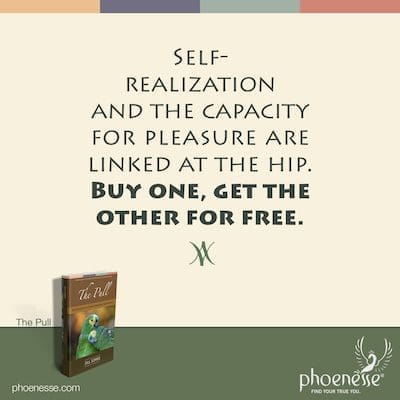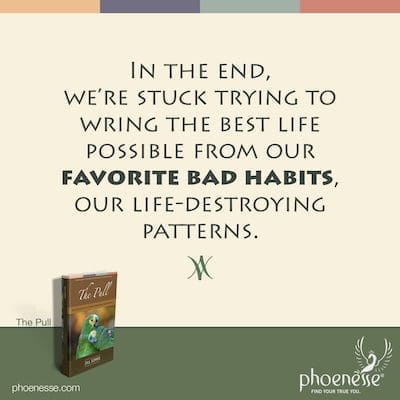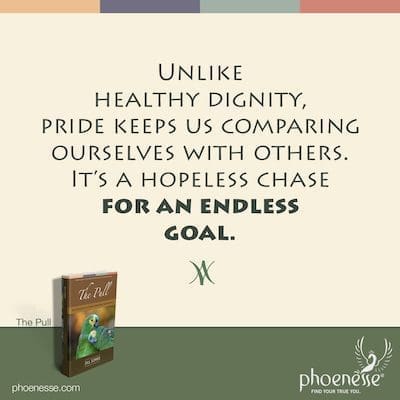For most of us, the idea of living in bliss sounds remote. It’s not exactly what we experience day-to-day. It seems so unreal and distant from the pleasure that is actually possible for human beings that it remains a vague theory, at best. Still, we sure hope to get there in, like, a few eons. Perhaps.

If we run in spiritual circles, we may have heard of things like “subtle bodies” of pure energy that stream forth from unstructured consciousness. The more we develop, the more we head in this general direction. So what we’re talking about is a matter of degrees. The intensity is what varies. So we, with our structured physical bodies, are by our very nature an obstruction to pleasure. The matter of the human body is essentially a pleasure blocker.
But as we grow and evolve, uncovering hidden blocks within ourselves and cleaning them out, we’ll come, more and more, into harmony with those cosmic streamings of energy. Freed from our inhibitions, we’ll be capable of a high degree of pleasure, as the energy of the subtle bodies scoots all the way to the surface of our beings—to our bodies.
So there’s no real difference between the ultimate state of bliss and our potential to enjoy the pleasure of it. It’s just a matter of degree. But how about our desire to have it? Is this in fact a legitimate thing? Isn’t it, as some people say, in opposition to true spiritual self-realization? Well, no, it’s not. At all. In fact, it’s a prerequisite.
Here’s the bottom line: when we block pleasure, we block our connection to our deep spiritual self. So spiritual self-realization and the capacity for pleasure are linked at the hip. Buy one, we get the other for free. Like salt-and-pepper shakers, they always come as a matching set.
In reality, pleasure is intensely fleshly. It’s also intensely spiritual. Ultimately, there is no gap. We’re all on a cosmic train ride heading to Pleasure Supreme. We don’t need a good-enough token to get on board. Bliss isn’t a reward for being good. It’s the natural state of a unified being. When we’re in harmony within ourselves and therefore with the universe, we’ll automatically be there. Full stop.
The pleasure of which we’re speaking is not some pleasant mental fantasy. It’s not a shallow substitute or an escape. This is a bliss that is experienced wholeheartedly in every fiber of our being—physical and spiritual both—with all our senses firing on all cylinders: we’re alive and awake and in bliss. Hey folks, this is our birthright we’re talking about. And our longing for it is real and healthy. What’s superfluous is all our confusions and dualistic splits that scatter marbles under our feet, creating misconceptions, fears and shame.
Here’s an idea of what living in pleasure looks like. Our whole being pulsates in harmony with other beings. There is no division within, no No-current digging in its heels, no doubt about “is it OK to have my bliss?”, and no if-and-or-buts about whether we’ll somehow mess up someone else’s bliss. No guilt and no hesitation. On the contrary, we’ll know that the greater our ecstasy and joy, the more we contribute a dose of something wonderful to the world. And that’s a shot in the arm that this world seriously needs.
This then will become our goal: make more bliss. We will act unceasingly on behalf of this wonderful goal. We’ll be inspired to search for other inner obstructions, patiently exploring so we can bring more aspects to the light. We will be glad to devote our time and effort to this worthy endeavor.
We’ll connect the dots between our personal pleasure and our full realization of ourselves. We will focus on our capacity to love intimately and completely with our whole body and spiritual being, which is such a rich tool for furthering self-purification. What’s not to love about this?
Yes, pleasure is possible on all levels of our personalities.
Just what does it look like to have pleasure on all the various levels of the human personality? First, there’s the well-known physical level where we can know physical health and well-being. These two things are dependent on the amount of pleasure the body is able to allow.
Pleasure is actually the regulator for health. When it’s streaming through us, it is sending the forces of health and self-renewal coursing through our bodies. As such, happy, healthy bodies live longer. On the flip side, when we deny ourselves pleasure—which we often do because we have hidden wrong concepts, fears and shame—to that same degree we cut ourselves off from that abundant wellspring of life-giving flow.
Each one of us is a mini-me of the great cosmic universe. All the same conditions and laws apply to both the macro and the micro being. So if we have a harmonious flow happening inside ourselves, we’re able to allow the greater flow of life to permeate us. It’s as though we’re plugging into the universal circuits of pleasure, health and spiritual healing powers. We’re in the universe and the universe is in us.
In this way, we transcend the limits of structure, even while we’re still in the physical body. Unlimited abundance becomes, more and more, part of the fabric of our being. And then once we transcend the body, this will happen in an even more absolute way.
But don’t be tricked into thinking that we need our physical bodies to experience pleasurable feelings. It’s just the opposite. Once freed from the block of physical matter, we’ll be able to experience blissful feelings, which arise from our subtle bodies, in an identical but more intense way. In an existence beyond Earth, we will be able to sustain the feelings of ecstasy that we currently experience in sexuality during a total fusion with another person. And yet, if we don’t put our fears and obstructions behind us, our spiritual existence will look a whole lot like the one we’ve got going on here.
We can look at deterioration of the physical body, including any illnesses and even death, as a manifestation of conflict, or denial of pleasure. So when we unfold spiritually, there must be an increase in pleasure. This flies in the face of many religious teachings that promote denial and sacrifice of pleasure. Such martyrdom is a total miss on what it means to be in truth. If we want to be in truth then, we can no longer look at pleasure as being negative, to be gained only at the expense of someone else. Pleasure needs to be liberated from the destructive currents it so often carries.
There is nothing here we’re being asked to believe. No one needs to tell us that when we feel pleasure, we are more energized and have a better sense of wellbeing. We can feel the truth of this for ourselves.

Now let’s dive a little deeper and look at pleasure on the psychological level. Enjoying pleasure here is as big a deal as having pleasure in the body. It involves shouldering the self-responsibility for being mature. It’s about accepting temporary difficulties, which are part of our present reality—which is nothing more and nothing less than an expression of our current state within. It’s about dealing with inevitable frustrations. Sure, they’re coming at us due to our own inner limitations. But still, we have to accept that yes, even we have limitations. And sometimes that ain’t easy.
In some sneaky part of our beings, we violate our own integrity when we secretly want to cheat life and have others take on the burden for our screw-ups. But who would want to give this up? Where’s the joy in committing ourselves to gut-level honesty and a positive approach to life? Do we have to give up the pseudo-satisfaction we get from all the games we play? Are we supposed to do all this conscious living in reality just for the sake of what is, and not for the sake of appearances? Can we really give these things up if we’re not totally convinced that the deepest possible bliss awaits us? If we abandon our poor substitutes for pleasure, isn’t it possible that we’ll have no pleasure at all?
In truth, as long as we’re convinced that our substitutes are all the pleasure there is, we’re not able to believe pleasure is for real. Living a decent life implies living a life of sacrifice. Yuck. But we’ve got this all wrong, because we’ve got our wires crossed. We can take in genuine pleasure only to the degree we give up all the distorted habitual ways we have found to activate our life force—which for many of us is through negative pleasure. To the extent we cling to these false ways of living, we can’t bear real pleasure.
The vicious circle we are caught in looks something like this: the less we want to give up our destructive ways, the less we can accept and believe in pleasure. The less we believe in real pleasure, the less we want to give up our favorite “pleasure.” The less we want to give up whatever obstructs us from genuine pleasure, the less commitment we have to experience real pleasure. In the end, we’re stuck trying to wring the best life possible from our favorite bad habits—our life-destroying patterns.
If there’s no by-product of pleasure, then being mature, self-responsible people who accept reality as it is, is going to be a tough sell. But then, how much fun is it really to insist on being an irresponsible child who makes others pay for our actions or inactions, and who secretly wants to cheat life? The lack of integrity wound up in this is simply never going to feel good.
And if, in our guts, we don’t feel good about ourselves, we’re a far cry from feeling pleasure. We’re just too busy roiling in negative inner energies. But by the same token, if we get a whiff of self-responsibility by way of some self-respect once we’re no longer trying to cheat life, to that same degree we become capable of experiencing pleasure.
If we can start to look forward to a full and pleasurable existence, it won’t be so hard to give up some of our destructive patterns. We’ll be able to stand on our own feet and accept life’s unavoidable frustrations. This equation must always come out even. Without an understanding of this basic truth, we’ll continue to hunt for pleasure in an unhealthy way, looking for a reward for the “good child” from some authority we depend on for good feelings.
We need to discover for ourselves the pleasure of self-autonomy, in the best sense of the word, which we have to work for. Once the notion that adulthood is a hardship eases up, we’ll feel less threatened by what self-responsibility entails. We’ll open to its rewards and its inherent pleasure.
From a logical point of view, there must be a direct correlation between our ability to realize personal pleasure and our ability to be emotionally mature and capable of loving. Plain and simple, we can’t love when we are busy clinging to someone else. Our dependency might have the superficial appearance of love, but of course, nothing could be further from the truth. Dependency arises from fear and it creates more fear. It leads down the road to hate and resentment. This we cover up like crazy because who in their right mind is going to love us if we actually hate them, this person we depend on.
No, love needs some space. It can only happen when we are free of our dependencies on others. And pleasure is only possible when we love. Sexual pleasure without love is sadly incomplete, always winding up down a dead-end street. Something will always be missing as it expresses an inner split between the spirit and body.
The total unification of pleasure results when we love and are sexual beings. Then we have emotional and mental integrity, so everything hangs together. Pleasure weaves intricately and intimately with spirituality, decency, emotional maturity and physical health.
So what blocks us from pleasure? Because, heck, offhand, we all want pleasure, right? We long for it. We strive for it. Darn right, we want it. What we ignore is the fact that we also don’t want it. We fear the bejesus out of it. Seriously?
Logically, it makes sense that if we fear something, we are going to want the opposite. So assume for a minute that there is a hidden fear of pleasure lurking inside us. In that case, we are going to inadvertently want the reverse: the unpleasure, as it were. So then of course we’re going to fear getting what we want, because that is negative pleasure, which always hurts. The less we are aware of this, the stronger the fear will be.
Here’s how it works. If we want to have pleasure, it can only be made possible when our mind and emotions are quietly confident, calmly expectant and receptive, patient and unanxious, unhurried and unworried. Otherwise, there will be a striving for pleasure that is attempting to battle against our fear of pleasure. We’ll feel anxious that we’re never going to have it. We’ll be pessimistic and even hopeless. This throws us into dramatic fluctuations between resignation and over-activity in which we act compulsively, blindly and inappropriately. What a great way to circumvent any chance at pleasure.
To battle this, we have to bring our fear of pleasure all the way up to the surface. A key pointer to look for is this waffling between anxious striving and the alternative plunge into hopeless resignation. This is the way to become aware that we are afraid of pleasure. From there, we’ve got to develop an acute awareness of the actual fear. This is not easy. But if we want this, we will find it.
No human being is free of this denial of pleasure. So don’t feel like you’re alone. It’s only a question of degree. Once we see how we fear and deny pleasure, we’ll stop making others responsible for our feeling deprived. We’re doing it to ourselves; we’re the ones who make ourselves suffer.
When some distortion lives within us that we are not aware of, it is extremely painful. The more unaware, the stronger its effect and therefore the more it hurts us. Hence, there is a struggle to become conscious—to bring all inner conditions to the forefront. We can’t free ourselves of vague anxiety and feelings of inadequacy without this important step.
We must know, feel and experience that this fight goes on inside us creating tension, separation and contraction. Our negative pleasure is geared toward gratifying our ego, rather than fulfilling our need to bath in the light of pleasure. It harbors three attitudes that are at the root of all evil: pride, self-will and fear. Because where there is pride—which includes the feeling that I must be better than you, as well as the feeling that I am worth less than you—there is self-will. And where there is fear, there will be a state of contraction.
No matter what approach of therapy we use, we will never, ever fully give up this contracted state if we don’t abandon our pride, self-will and fear. They help the ego keep a tight and rigid grip. Self-will will always be clamoring: “Me, me, me!” This “me” is the little me, the little self. It only cares about its outer personality, while ignoring the greater consciousness of which we are each an expression.
Unless we find a way to unify with this universal consciousness that transcends the ego, we are going to need to hang onto the ego; it will feel like our only lifeline. We falsely believe that the minute we let go of our ego as the sole ruler of human life, we’ll be annihilated. More importantly, when we identify exclusively with the ego, we can’t identify with either the greater consciousness or with the feelings in our bodies. They go hand-in-hand.
The yummy feelings that spontaneously flow into our bodies are an expression of universal truth, just like guidance, inspiration and inner knowing. But they can only flow into us when we identify our being with something that is beyond the limited boundaries of the ego.
The tight little ego is effectively saying, “My ego world is the only thing that counts. This is all there is to me. So I can’t give it up, otherwise I won’t exist.” Not such a relaxing place to hang out. Back to total real pleasure, it requires the ability to let go of this ego state, so that we are carried and enlivened by a greater power within the body and soul.

Pride says, “I am better than you.” It puts us in a place of separateness where everything is about one-upmanship. Pretty much the opposite of the state of love. It also shows up as a feeling of being worse than others: “I’m worthless, I have no value. I must pretend I am more to hide this fact.” These may not be conscious thoughts, but they might also not be all that unconscious.
Unlike healthy dignity, pride keeps us comparing ourselves with others. This is a perpetual illusion; no true evaluation of a person can ever be arrived at this way. It’s a hopeless chase for an endless goal. It’s also exhausting and frustrating. The chasm between ourselves and others widens, swallowing whole the possibility for love. Pleasure is then a long ways off.
It doesn’t matter if we literally think we are better than others, or only pretend as a way to hide our feelings of worthlessness. It’s all the same. It doesn’t produce a loving state. Love is not something we can command or that weakens us.
Love is actually the most selfish attitude there is. It brings the greatest pleasure—physical, emotional and mental. Long story short: love feels good. Love opens us up. We pulsate in a state of peace. We’re excited, secure, vibrant and utterly confident. We feel sweet inside and out, from our innermost being to the tips of our fingers. Doesn’t sound so much like the tense, anxious and contracted state of pride favored by the ego, does it? We can’t fake relaxed. And we need such a struggle-free and unpretending state if we want pleasure. It’s absolutely required.
Fear is also a contracted state. It can’t trust anyone. When we’re in fear, there’s no way we’re going to let go. So we end up bound up by our own negative creations, and we don’t want to see this in ourselves. We want to let go and have pleasure, but the ego is scared. So we blame someone else for our lack. Nothing good comes from this. No, what generally comes is bitterness, anger and defiance. The confusion created from all this torments us.
So what is it that we need to let go of? In the long run, our destructive attitudes. We need to accept the pain we have created through our destructiveness and wrong thinking. It’s time to hold still instead of fighting against the tide. We don’t need to keep running, we just need to relax. We can cultivate an inner calmness, allowing agitation of the mind to settle down and inner turbulence to cease. This is not apathy or paralysis. It is a tuning into the harmonious movement of the universe and finding a way to get in sync with it.
This will make it possible for another kind of movement to make itself known. It will combine inner activity with calm receptivity and motionlessness. Both are intrinsic parts of movement. So what appears, on the ego level, to be contradictions, will become unified on this different wavelength. Then the self doesn’t struggle against itself. No pushing. No tense striving. There will be timelessness, even while in the body.
At first we’ll see this in glimpses. Each time, it will leave us stronger, more unified and more complete. The ego will be more fully integrated with the greater self. And of course the place we can experience this most intensely is when we’re in a love relationship.
But we can work with whatever nonpleasure arises in any given moment. If we sufficiently explore what any situation offers, we’ll find pearls. If we start out significantly disconnected from ourselves, we’ll have to grope and probe to see what’s going on. We’ll need some patient letting go along with some trusting expectancy. We have to struggle and not struggle, in both the right way and to the right measure.
You’d think that remembering a former similar state of mind would help, but it won’t. Truth must be recaptured anew, every time. Memory is only going to help us know that truth can be attained; all this is not an illusion. No, it’s not easy to transcend what we’ve created in the present moment. It’s not easy to tune into the greater cosmic rhythm. But the more we do it, the easier it becomes. Eventually, this will become the new zero point. Being disconnected will be the exception.
The pain of difficult times serves to bring us toward our inner center and acts as a catalyst for growth. We can explore what arises, looking at ourselves clearly so we can become an integral part of pleasure. That must always be our aim. It’s the goal and also the balm, without which we can’t heal.
A path of healing is not something to dread as a difficult chore. Every step is, in itself, a joyful thing because ultimately it brings liberation. Every win brings a little more bliss to the degree we are able to overcome our own resistance. But pleasure is our birthright and our ultimate destiny. In truth, there is nothing to fear.
Return to The Pull Contents
Read Original Pathwork® Lecture: #177 Pleasure – The Full Pulsation of Life



